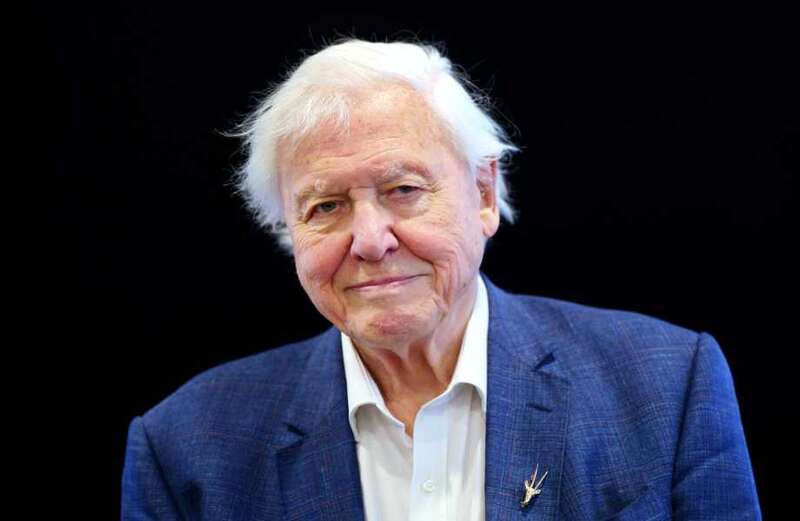SURROUNDED by discarded plastic, a four-month-old Laysan albatross vomits up a lighter and bottle top.
Empty bottles lie next to it on a remote beach hundreds of miles North of Hawaii, as the bird gags.


These are the shocking scenes filmed by Sir David Attenborough’s TV crew for the return of his Netflix series, Our Planet.
Moments earlier, the albatros’s unsuspecting father had passed the two bits of rubbish through to its beak after returning from a three-week trip in the Pacific in search of food.
Innocently mistaking them for food, the dad could so nearly have killed this new chick, had it not been for quick reflux motions.
 From tongue scraping to saying no, here are 12 health trends to try in 2023
From tongue scraping to saying no, here are 12 health trends to try in 2023
Yet as Sir David warns, for many other young birds, a “death sentence” awaits them.
He says: “Laysan albatrosses are in the greatest danger.
“They consume more plastic than any other seabird and it is getting worse each year.
“Across the island chicks are dying.
“There is now so much plastic in our oceans that it reaches even the most remote islands on Earth, carried by the currents.
“The parents mistake small floating pieces for food and bring it to their young, accidentally killing them.
“It’s almost certain every chick on the island has plastic in its stomach. Those that are fed too much starve to death.”
He goes on to describe the startling moment the baby albatross thankfully manages to sick up theobjects, adding: “What looks like a lifeline could be a death sentence. “This could be the last meal the chick is ever given.
“Albatrosses normally throw up hard to digest parts like squid beaks and bones, ejecting lighters and bottle caps however is more of a challenge. But this chick is, thankfully, a survivor.”
The heartbreaking scenes come seven years after Sir David shocked the world with his warnings about how plastic pollution in our oceans is destroying wildlife.
 How to de-clutter if you have a beauty stash to last you a lifetime
How to de-clutter if you have a beauty stash to last you a lifetime
And just as that Blue Planet show sparked a global debate about what more could be done, he hopes this new series will demonstrate why it is so important to allow animals to be able to move freely across borders if they are to survive.
Sir David’s 50-strong Silverback Films team began filming the new four-part series in 2020 and have spent 934 days getting up to many different animals.
They have shot extraordinary footage of creatures such as lions, buffaloes and polar bears, across seven continents and 21 countries including Botswana, the Arctic, British Columbia and New Zealand.
As well as discarded plastic killing seabirds, rising temperatures and the melting of ice in the Arctic continues to get worse, Sir David warns.
He reveals polar bears are now being forced to swim eight hours a day during the summer as once-solid ice resting points are disappearing.
Sir David says: “Home changes so much each year that he can’t keep to a limited territory.
“Instead, he must roam thousands of kilometres in search of seals. But every summer as the ice begins to melt, he spends less time walking and more time swimming — now for more than eight hours a day.”
Alarmingly, another Arctic animal, the walrus, may also have nowhere to go if the ice disappears in the next decade.
Sir David says: “This year, the temperature climbs to a staggering 38C, melting sea ice faster than ever. And one Arctic animal is affected more than most, the walrus.
“In the next decade, this summer sea ice could disappear altogether. If that happens, even for the Arctic’s most seasoned travellers, there may be nowhere left to go.”
Yet just as the melting ice is causing havoc in the Arctic, so too are the rising temperatures in Africa.
Gripping footage shows one lone buffalo bull killed in a matter of minutes by five lions as it searches for water.
Back across the Pacific, whales have just 90 days to eat over the summer.
Longer daylight, warns Sir David, means it may be the only time they feed in the entire year.
He says: “Here five months ago there were just 7 hours of light a day, there are now 17.
“Over the summer, each scoop up 900 tonnes of food. They all have just 90 days to eat as much as they can.”
Yet it is the adorable baby albatross that will leave millions of viewers on the edge of their seats.
Hinting of more trouble to come, with the arrival of a tiger shark near the edge of the ocean as the bird attempts to fly out to embark on its new life, Sir David warns: “A chick’s first flight may never be a long one.
“The tiger sharks have arrived. And they are very effective. For the young albatross, it’s not exactly encouraging but it’s now or never”
- Our Planet II will be available for streaming on Netflix from June 14.



































